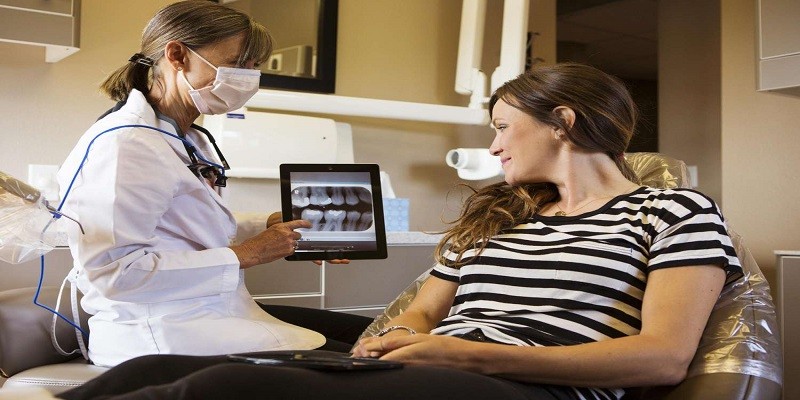Last Updated on April 5, 2023
Yes, you can get dental X-rays while pregnant. However, it is important to talk with your dentist before having any kind of radiography done during pregnancy. Your dentist may recommend that you wait until after the baby is born or take additional precautions if the X-ray is absolutely necessary for proper treatment.
The amount of radiation exposure from a dental X-ray is very small and typically does not pose a risk to pregnant women or their babies. Depending on how far along in your pregnancy you are when getting an X-ray, lead shields may be used to protect your abdomen from any unnecessary radiation exposure and lower the overall dose required for imaging. Additionally, digital radiography involves much less radiation than traditional film radiography and also provides higher quality images so it should be used whenever possible during pregnancy.
- Step 1: Schedule an appointment with your dentist
- Be sure to mention that you are pregnant during the scheduling process so they can make any necessary accommodations for you
- Step 2: Discuss x-ray safety concerns with your dentist
- Let them know about your pregnancy and ask if there are any special precautions needed when taking dental x-rays while pregnant
- Step 3: Follow all instructions from your dentist before, during, and after the x-ray procedure
- This may include wearing a lead shield over areas of the body not being imaged or using a device called a “bite block” to keep your mouth in place during imaging
- Step 4: Ask for additional shielding material if available at the office such as aprons or gowns with leaded panels that can be placed over larger parts of the body like abdomen or chest area to provide extra protection against radiation exposure while pregnant
- Step 5: Let the technician know if you experience any discomfort during the procedure so adjustments can be made promptly to ensure proper imaging results without posing risk to you or your baby’s health
Can one go for dental X rays during pregnancy? – Dr. Rajeev Kumar G
Q: Is It Safe to Get Dental X-Rays While Pregnant
A: Dental X-rays are generally considered safe for pregnant women. Although there is no definitive evidence that the low levels of radiation from dental X-rays can harm a developing fetus, it’s best to discuss the risks and benefits with your dentist or obstetrician before getting one done while pregnant. Your dentist may recommend an alternate imaging option such as an intraoral camera or digital scanners in order to minimize exposure to radiation.
Be sure to let your dentist know if you’re pregnant so they can tailor the X-ray accordingly and take extra safety precautions during the procedure.
However, Your Dentist Should Take Extra Precautions When Taking X-Rays During Pregnancy by Using Lead Aprons And Shields to Protect You from Any Unnecessary Exposure of Radiation
When taking X-rays during pregnancy, it is important that your dentist takes extra precautions to protect you from any unnecessary exposure to radiation. This includes the use of a lead apron and other shields to minimize your exposure. Lead aprons help absorb some of the radiation emitted by the X-ray machine in order to prevent it from reaching you directly.
In addition, lead shields are placed around areas not being examined in order to reduce any additional radiation exposure. Your dentist should also be sure to only take necessary images since too many can increase your risk of exposure even further.
Q: Are There Special Considerations for Dental Care During Pregnancy
Yes, there are special considerations to keep in mind when it comes to dental care during pregnancy. Expectant mothers should take extra precautions with their oral health as changes in hormone levels can increase the risk of tooth decay and other gum diseases. It is important that pregnant women maintain regular dental check-ups and cleanings throughout the course of their pregnancy since some procedures, such as x-rays, may not be safe for expecting moms.
Additionally, certain medications used during routine dental treatments could pose a potential risk to both mother and baby so they should always inform their dentist if they are pregnant or trying to become pregnant. Lastly, because morning sickness can cause acidic erosion on teeth enamel expectant mothers should pay particular attention to brushing and flossing at least twice daily with fluoride toothpaste.
Additionally, Most Invasive Treatments Such As Fillings Or Extractions Should Be Avoided During the First Trimester Due to Possible Risks Associated With Anesthesia Use
It is generally advised to avoid invasive treatments such as fillings or extractions during the first trimester of pregnancy due to the potential risks associated with anesthesia use. Anesthesia can cross the placenta and enter the baby’s bloodstream, which may have a negative effect on their development. In addition, some studies suggest that there could be an increased risk for certain birth defects and other complications in babies if their mother had been exposed to anesthesia during this period.
Therefore, it is important that pregnant women discuss any necessary dental procedures with their healthcare provider before making a decision about whether they should proceed with treatment while pregnant.
It is Important to Inform Your Dentist That You are Pregnant So They Can Provide Appropriate Guidance on Managing Your Oral Health Needs Safely
It is important to inform your dentist that you are pregnant in order to ensure the safety of both you and your baby. During pregnancy, hormonal changes can make gums more sensitive and prone to gum disease. Your dentist will be able to provide guidance on what preventive measures should be taken such as regular brushing, flossing and using a fluoridated mouthwash or toothpaste in order to maintain good oral health during your pregnancy.
They may recommend specific treatments such as scaling and root planing for any existing gum problems or prescribe medications which have been deemed safe for use during pregnancy. Additionally, they may suggest modifications of certain procedures, such as x-rays, depending on the stage of your pregnancy. It is essential to discuss these matters with your dentist so that they can adjust their approach accordingly while still providing quality care throughout your entire journey!
In the modern world, there is a growing need for businesses to embrace digital transformation. Digital transformation is a process that involves transforming traditional business processes and operations into more efficient and effective ones utilizing digital technologies such as cloud computing, artificial intelligence, analytics, mobility solutions, etc. By embracing this technology-driven approach to business operations and processes, companies are able to increase their efficiency while reducing costs and improving customer service experiences.
Additionally, it can help them stay competitive in an ever-evolving marketplace by giving them access to new markets or customers they may not have been able to reach before without these technologies.

Credit: swfamilydentistry.com
Dental X Rays While Pregnant Third Trimester
Dental X-rays during the third trimester of pregnancy should be avoided if possible, as there is a risk that exposure to radiation can harm the fetus. If necessary, dental X-rays can be taken with extra shielding and protective measures to minimize the amount of radiation exposure. It is important for pregnant women to discuss any potential exposure with their dentist or doctor prior to having an X-ray taken.
Conclusion
In conclusion, although there are some potential risks associated with getting dental X-rays while pregnant, it’s important to remember that the benefits of preventive care far outweigh any potential risk. Ultimately, it’s best to consult your dentist and primary care physician before undergoing any type of treatment in order to ensure you’re making an informed decision about your health during pregnancy.







